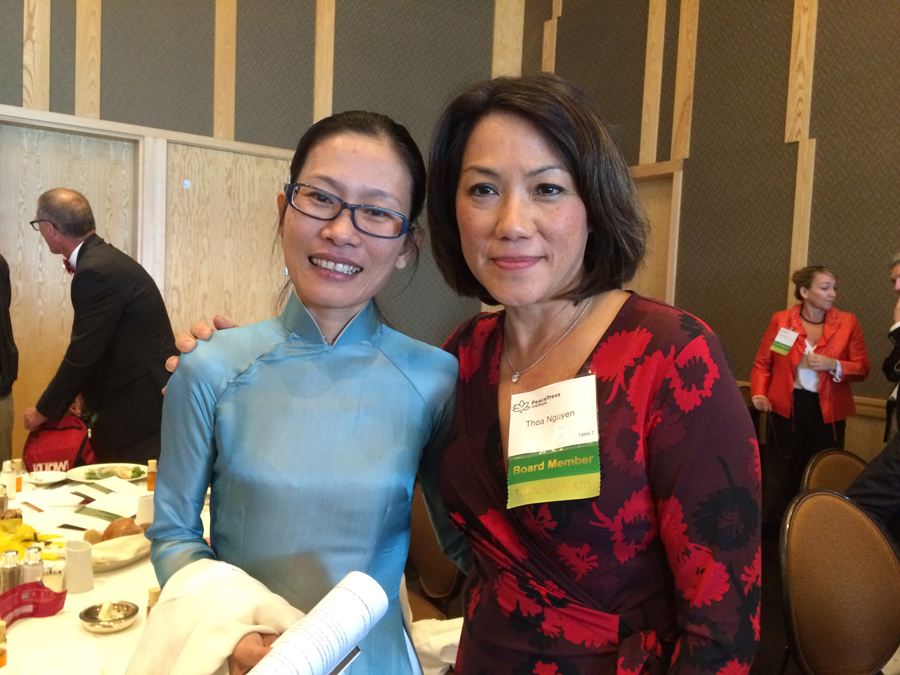By Assunta Ng
Northwest Asian Weekly
The scar between Vietnam and America remains deep even after the Vietnam War ended 40 years ago. How do you reverse the consequences of a war?
Enter PeaceTrees Vietnam, founded by Seattleites in 1995. It’s about one tree at a time — it’s one landmine at a time. It’s a promise to help those who have suffered from the consequences of the Vietnam War — it’s a tale of healing between Americans and Vietnamese.
“How do you turn ghosts into ancestors (healthy environment and fertile lands)?” asked Karl Marlantes, author and keynote speaker for PeaceTrees’ fundraising luncheon at the Four Seasons Hotel on Oct. 25.
The ghosts that Marlantes, a former U.S Marine who served in the Vietnam War, referred to are the dangers and fears associated with landmines, left behind after the war ended. But through the courage of the Vietnamese people who clear the landmines, a direct and horrible effect of the war, the land gets rehabilitated, turned into safer environments and fertile soil. The literal and figurative transformation turns the landscape from ghost to ancestor.

Many lingering different remnants of war, from January 2013 (Photo from PeaceTrees Vietnam)
PeaceTrees is dedicated to clearing landmines in the Quang Tri province, an area heavily impacted by the legacy of war. More than 10,800 people have been killed or maimed by landmines and unexploded ordnance (UXO). Bombs, shells, grenades, landmines, or cluster munitions that didn’t explode when they were originally deployed still pose a risk of detonation, even many decades later.
Since PeaceTrees began, more than 93,000 mines have been cleared, and 43,850 trees have been planted in Vietnam. Also, the group organized 59 citizen diplomacy trips to Vietnam for tree planting, in addition to providing support for medical treatment, nutritional support, scholarships, and micro-credit lending for UXO victims and their families.

PeaceTrees staffmember Pham Thi Hoang Ha (left) with PeaceTrees boardmember Thoa Nguyen (Photo by Assunta Ng/NWAW)
Pham Thi Hoang Ha, a staff member of PeaceTrees who works in Vietnam, said the team has increased the area “cleared this year far more than last year. [They have] collected and disposed 3,259 UXOs.”
Ha said expanding the scope and scale of PeaceTrees’ work means it will “clear more safe land for children to play, farmers to grow crops such as pepper, more schools and libraries to be built safely.”
Ha said the “peppers are growing very well. Farmers are [becoming] more and more involved in the project: learning, doing, visiting their farms every day …”
Ha said the pepper project is life-changing for the villagers, and they are aware of it. The black pepper from farms can give the farmers products to sell, and it raises their income five times more than they get with rice.
Thoa Nguyen, owner of Chinoise Restaurant and a board member of PeaceTrees, said the purpose of PeaceTrees is “to help Vietnamese people, the children in Quang Tri to feel safe, secure, and sheltered. Vietnamese farmers can till their land free of worry and fear. Remnants of war become a remnant of the past.”

Unexploded ordnance clearance, from August 2012 (Photo from PeaceTrees Vietnam)
De-miners
De-mining is dangerous work, even with training. So far, no accidents have happened under PeaceTrees’ watch. However, one de-miner from another de-mining organization was killed earlier this year.

Clearing a large bomb on a hill, from February 2013 (Photo from PeaceTrees Vietnam)
PeaceTrees has added six de-miners, including female de-miners. In total, PeaceTrees has 38 de-miners in partnership with the Vietnamese government. PeaceTrees is the only American organization working on de-mining in Vietnam. The Vietnamese government has its own groups cleaning up the remnants of war. Imagine four decades later, the ‘ghost’ is still present.
PeaceTrees’ history
PeaceTrees’ founders are Jerilyn Brusseau, her late husband, Danaan Parry, and her mother, Rae Cheney. The family founded PeaceTrees when Brusseau’s brother Lt. Daniel Cheney, a pilot, was killed in 1969 during the war.
As part of their healing and honoring their losses, the idea for PeaceTrees was born. But the family had to wait 25 years to start their project.
“There were no diplomatic relations between Vietnam and the U.S. [until 1995],” said Brusseau. “In 1996, we tracked down organizations and worked with the Vietnamese government.”
Together, they worked with the Vietnamese people and also with the U.S. State Department to clear the mines.
Brusseau is excited that PeaceTrees has reached another level after 21 years. “We have established the next generation of leadership to lead this work. Trust is most important in working together over a long period of time. We have more work and productive work to do in the future.”
PeaceTrees raised $170,000 from 380 guests, among them were several Vietnam veterans, at its luncheon.
Assunta Ng can be reached at assunta@nwasianweekly.com.



